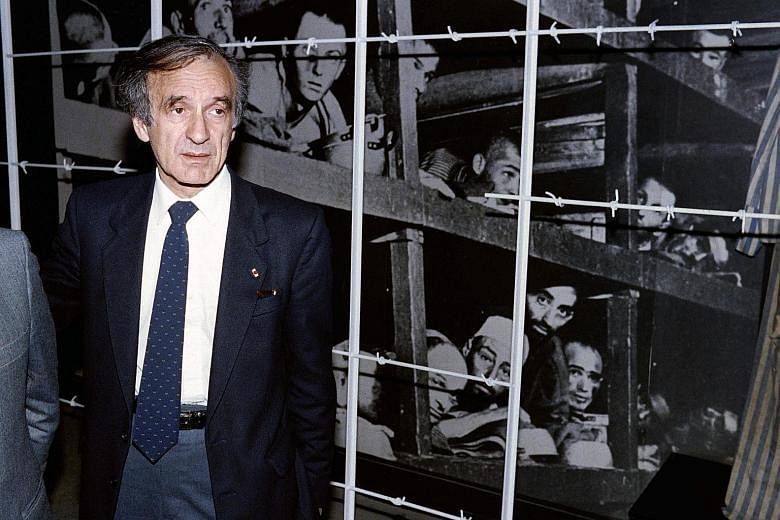NEW YORK • Holocaust survivor Eliezer "Elie" Wiesel, the memory keeper for victims of Nazi persecution and a Nobel Peace laureate who used his moral authority to force attention on atrocities worldwide, died on Saturday at his home in New York. He was 87.
By the time of Mr Wiesel's death, millions had read Night, his account of the concentration camps where he watched his father die and where his mother and younger sister were gassed. Presidents summoned him to the White House to discuss human rights abuses in Bosnia, Iraq and elsewhere, and the chairman of the Norwegian Nobel Committee called him a "messenger to mankind".
"Elie Wiesel was one of the great moral voices of our time and, in many ways, the conscience of the world," President Barack Obama said in a statement.
When Mr Wiesel emerged, gaunt and near death, from the Buchenwald concentration camp in 1945, there was little indication that he - or any survivor - would have such a presence in the world. Few survivors spoke openly about the war. Those who did often felt ignored.
But as time passed, more survivors began to open up about the war. Among the most prominent of them was Mr Wiesel, who in the 1960s, by then living in the United States, began a celebrated lecture series in New York City.
In 1978, president Jimmy Carter appointed Mr Wiesel chairman of the President's Commission on the Holocaust, which would call for the creation of the US Holocaust Memorial Museum in Washington.
It was an important recognition of his role in the Holocaust community. Another turning point came in 1985 when Mr Wiesel publicly confronted president Ronald Reagan about a coming trip to West Germany, where the president planned to visit a cemetery containing the graves of several dozen members of the SS, the elite Nazi force.
And speaking at the dedication of the US Holocaust Memorial Museum in 1993, Mr Wiesel faced president Bill Clinton and said: "Mr President, I must tell you something. I have been in the former Yugoslavia last fall. I cannot sleep since what I have seen. As a Jew I am saying that. We must do something to stop the bloodshed in that country."
Mr Clinton later told reporters he accepted Mr Wiesel's challenge. He went on to lead Nato in two bombing campaigns in the Balkans, first in 1995 against Bosnian Serbs and four years later to stop ethnic cleansing in Kosovo.
Later in Mr Clinton's administration, Mr Wiesel challenged him about the 1994 genocide in Rwanda. "Why are we... so nobly involved in Kosovo and why were we not in Rwanda?" he asked at the White House in 1999. "I think we could have prevented that massacre. Why didn't we?"
Mr Wiesel said in his Nobel acceptance speech that Jewish issues would always be of paramount interest to him. He belonged to a "traumatised generation", he said, and it would be "unnatural" for him to feel otherwise.
But he also said other causes were as important to him. Mr Wiesel compared apartheid with anti- Semitism and backed the Solidarity movement in Poland. He spoke out on behalf of Soviet Jews, Cambodians and the Kurds, among other populations. But critics accused Mr Wiesel of having a blind spot where Israel was involved.
Speaking about the Holocaust, he often emphasised his conviction that it was an unparalleled event in history. "I have learned that the Holocaust was a unique and uniquely Jewish event, albeit with universal implications," he said in one speech. "Not all victims were Jews, but all Jews were victims."
To forget the Holocaust, he always said, would be to kill the victims a second time.
WASHINGTON POST

